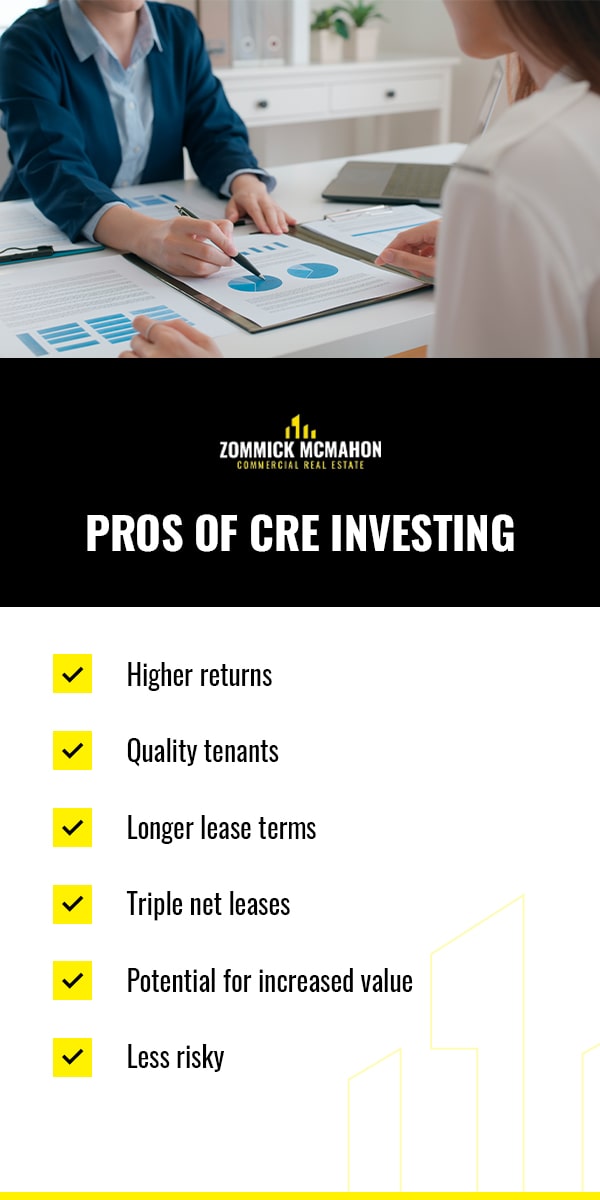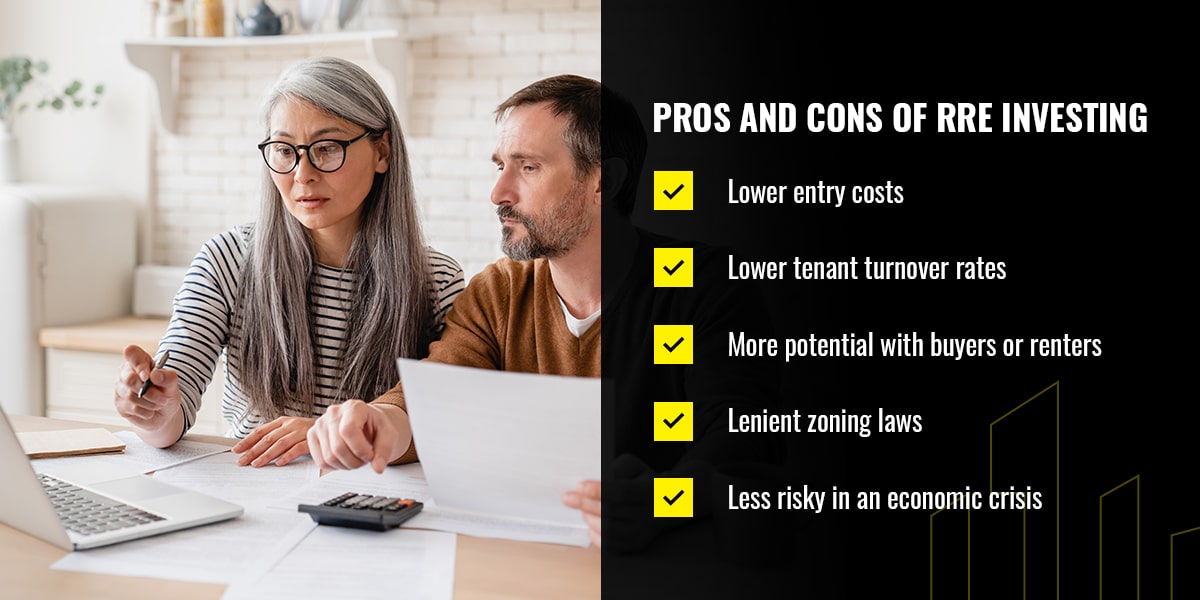
Investing in real estate can be an excellent way to boost your income and build your investment portfolio. Before investing, you must determine whether you want to invest in commercial or residential real estate. Experienced investors often invest in both types of property for their benefits, but new investors may be uncertain where to start.
There are significant differences between these two types of real estate, especially regarding their benefits. Some investors prefer to work strictly with residential property, while others prefer commercial. Learn more about the difference between residential real estate and commercial property investing and how you can break into the industry.
Property Differences: Commercial vs. Residential Real Estate
The difference between commercial real estate (CRE) and residential real estate (RRE) is simple. Residential real estate is single-family homes and residential rental properties between one and four units, while commercial real estate is residential properties with five or more units and properties used for business.
Residential and commercial properties have various types. For example, RRE includes condos or townhomes, while CRE includes hotels or retail buildings. Any property that can be used to provide people a residence is residential and is used solely for that purpose. In contrast, any property for business operations can be considered commercial real estate.
One of the main differences between the two types of real estate is how they’re rented or leased, including the legality involved with every property. This difference also means that investing in either property type is vastly different from each other. Different tenants are also attracted to each kind of real estate. Individuals or families typically rent residential properties, while companies and businesses lease commercial properties. Each type of property also has different opportunities for investors.
Pros and Cons of CRE vs. RRE Investing
Commercial and residential real estate have unique benefits for investors, but you’ll also want to be aware of the drawbacks before choosing one or the other for your investment portfolio. Learn more about the pros and cons of both types of real estate so you can make an informed decision when you start looking at properties.

Pros and Cons of CRE Investing
Commercial real estate is a lucrative market for many investors as business tenants can generate substantial revenue. Other reasons investors may choose commercial properties over residential properties include:
- Higher returns: Compared to RRE, investing in commercial property typically comes with higher returns and more consistent cash flow. On average, commercial properties have a historical annual return rate of 10%, but this varies based on your expenses, yield, tax obligations and other factors. This return rate is usually higher than residential investments. These properties often have more space to rent out to tenants, meaning more incoming cash flow. CRE can be an excellent way for investors to diversify their portfolios while increasing their investment returns.
- Quality tenants: Investors with residential rental properties may find it more challenging to find quality tenants to rent their space. They may damage the property or fail to pay rent on time. However, businesses that rent out commercial space are more likely to be trustworthy and respect the property and owner, though this isn’t always the case. In most cases, though, businesses and corporations are more likely to be qualified tenants and make things easier for the investor.
- Longer lease terms: Residential properties tend to have short lease terms, with maximum periods lasting 12 to 18 months. In comparison, commercial real estate can lease for up to 10 years. Longer leases prevent high vacancy and turnover rates, sustaining long-term cash flow. CRE investors won’t have to worry about paying for marketing each year when looking for new tenants.
- Triple net leases: In a triple net (NNN) lease, the tenant is responsible for all the expenses associated with the property, including insurance, maintenance and taxes. In other types of leases, these responsibilities fall to the landlord. Big companies typically sign these leases so they can alter the property to fit their brand. These leases help commercial real estate owners save money since they pay little to nothing for maintenance and other expenses. Triple net leases are exclusive to CRE.
- Potential for increased value: While surrounding properties influence the value of residential properties, commercial property values are more affected by the revenue they generate. In simple terms, the more cash flow, the higher the property’s value. You can potentially see an increase sooner in your commercial property’s value than you would with a residential property.
- Less risky: Commercial real estate can be less risky than residential real estate since the lease terms tend to be more solid, leading to a steady cash flow. Residential properties can experience high turnover and drastic changes in value due to the fluctuating market, whereas commercial properties have long leases and rely more on revenue to determine value. Investors looking to own long-term properties are better off choosing CRE as these properties are less risky and typically allow for long-term gains.
Investors can benefit significantly from investing in commercial properties. However, there are a few challenges to consider before jumping into the market and purchasing your first property, including:
- Complicated analysis: Commercial real estate requires investors to analyze multiple metrics, including return on investments (ROIs), capitalization rates, appreciation and equity buildup. Owning a commercial property is much like owning a business and requires more time and effort to maintain properly. Investors just getting into the industry should consider the workload and their ability to analyze these metrics accurately.
- Challenging entry: Commercial properties usually require more capital for down payments and other expenses than residential properties, making it challenging for new investors to get started. Repairs and maintenance also tend to cost more for these properties, which can be challenging for investors who don’t have multiple sources of income to afford these expenditures. Investors in commercial properties must keep their gains higher than their costs, which can be difficult for inexperienced investors looking to break into the field.
- Knowledge requirements: As we mentioned, commercial real estate has numerous complicated metrics to analyze. Investors with little to no experience with or knowledge of investing may find it challenging to navigate all of the requirements for commercial properties and may require professional assistance. Professional help will cost money, meaning investors must budget some of their revenue. If new investors find it challenging to make enough revenue to cover common expenses, they may not make enough to afford professional help and could manage their investments poorly.

Pros and Cons of RRE Investing
While you may think that commercial real estate is the right choice, you’ll want to understand the benefits of residential real estate before deciding. Some of the main reasons investors choose residential properties include the following:
- Lower entry costs: Residential properties tend to cost less than commercial properties, especially for starting investors. The average person is likelier to have enough savings to fund a downpayment on a residential property, whereas commercial property down payments generally require more capital. Investors can purchase multiple residential properties to increase their cash flow until they can invest in commercial property if that’s one of their goals.
- Lower tenant turnover rates: It can be challenging for CRE owners to keep long-term tenants as businesses evolve and grow, requiring new space. Residential property owners may worry less about high turnover rates, especially if they own single-family homes as families often look to settle in one location. It’s easier to find long-term tenants if you use appropriate tenant screening techniques and market to your desired audience. Looking specifically for long-term tenants increases your likelihood of finding renters who will treat your property as if it were their own.
- More potential with buyers or renters: Residential properties usually have a more extensive buying and renting pool since everyone needs a place to live. Commercial properties rely solely on businesses renting out the space, while residential real estate depends on people needing a home, which applies to every person. Since people are always looking for a place to live, RRE is an attractive investment for many people.
- Lenient zoning laws: Residential real estate is often more indulgent than commercial real estate, which usually comes with more red tape, making it challenging to get building permits and navigate zoning laws. These laws and regulations are generally less extensive and complex for RRE, making it a more accessible investment for new investors.
- Less risky in an economic crisis: When the economy experiences a downturn or crisis, businesses are typically the first to feel the hit and lose their revenue. Marketing commercial properties during a financial crisis can also be more challenging. Residential properties don’t experience as much risk during these events since housing is always in demand.
While there are numerous benefits to investing in residential real estate, there are also a few drawbacks to consider before picking it over commercial real estate. Some of the disadvantages include the following:
- Potential to miss out on working with other investors: In residential real estate, investors tend to own the property independently, though they may have one or two co-investors. Working alone can cause residential investors to miss out on collaborating and interacting with experienced investors.
- Less lucrative: If you don’t put the proper effort into tenant screening and marketing, you could get less than ideal tenants, leading to short lease terms or increased damage. More marketing and maintenance costs can make generating revenue more challenging than commercial property, especially if tenants miss rent. Taking the time to screen tenants properly can prevent this from happening.
- More responsibility: Landlords of residential real estate must take on the responsibility of maintenance and repairs, which can be time-consuming and costly. Investors can choose to hire a property management company, but paying the fee can be difficult for new investors or those with a lower cash flow.

How to Decide Which Investment Is Right for You
It’s not easy to decide whether or not you should invest in commercial real estate since there are benefits and drawbacks to consider. Residential real estate may seem more appealing, but there are just as many disadvantages to consider. Both real estate types can help you build and diversify your investment portfolio. Real estate investment can also bring you tax benefits and help you achieve financial goals. Choosing which type of property is right for you can be especially challenging if you’re new to real estate investing.
In the end, it comes down to what your goals are for real estate investment. Investors looking for short-term gains are often better off investing in residential real estate. However, investors looking for long-term gains and passive income may find commercial properties provide the avenue for these goals.
If you’re considering investing in CRE, here’s how to get started:
- Understand how residential and commercial real estate are different: Commercial income is closely tied to the usable square footage of the property. Residential rent is usually quoted in cost per unit per month, while commercial rent is quoted in cost per square foot per month or per year. Commercial leases also tend to be longer than residential leases. Commercial properties can bring in more revenue than residential properties, but they also tend to cost more.
- Analyze comparable properties: Comparing similar properties in the area of the same size and style can help you accurately determine the value of the property you’re interested in. This analysis ensures you invest in a property at a fair price — you may even find a great deal on a property that allows you to increase your revenue.
- Use the proper calculations: The key to success in investing in a commercial property is using the appropriate calculations and formulas, including net operating income, the capitalization rate and cash on cash. These formulas will help you find the information you need to invest successfully in commercial property and make the most of your money.
- Reserve funds for contingencies: Things happen, and you may need money one day for lost cash flow or other events that cut into your revenue. Saving money or budgeting for these contingencies can prevent you from being surprised by these expenses and helps you sustain a stable income.
Invest in Commercial Property With Zommick McMahon Commercial Real Estate
Investing in commercial real estate can help you diversify your portfolio and create a passive income. If you’re interested in investing, Zommick McMahon can help. We have significant experience in the real estate industry and can help you navigate investing, whether you’re just starting or looking to expand on current properties. We also offer individualized attention, ensuring we give you the help you need and meet your requirements.
Our brokers are dedicated to superb customer service and aim to find you the best investment sales deals possible. We can help you understand the intricacies of commercial real estate investment. Contact us today to learn more about how we can help you with commercial property investments!

